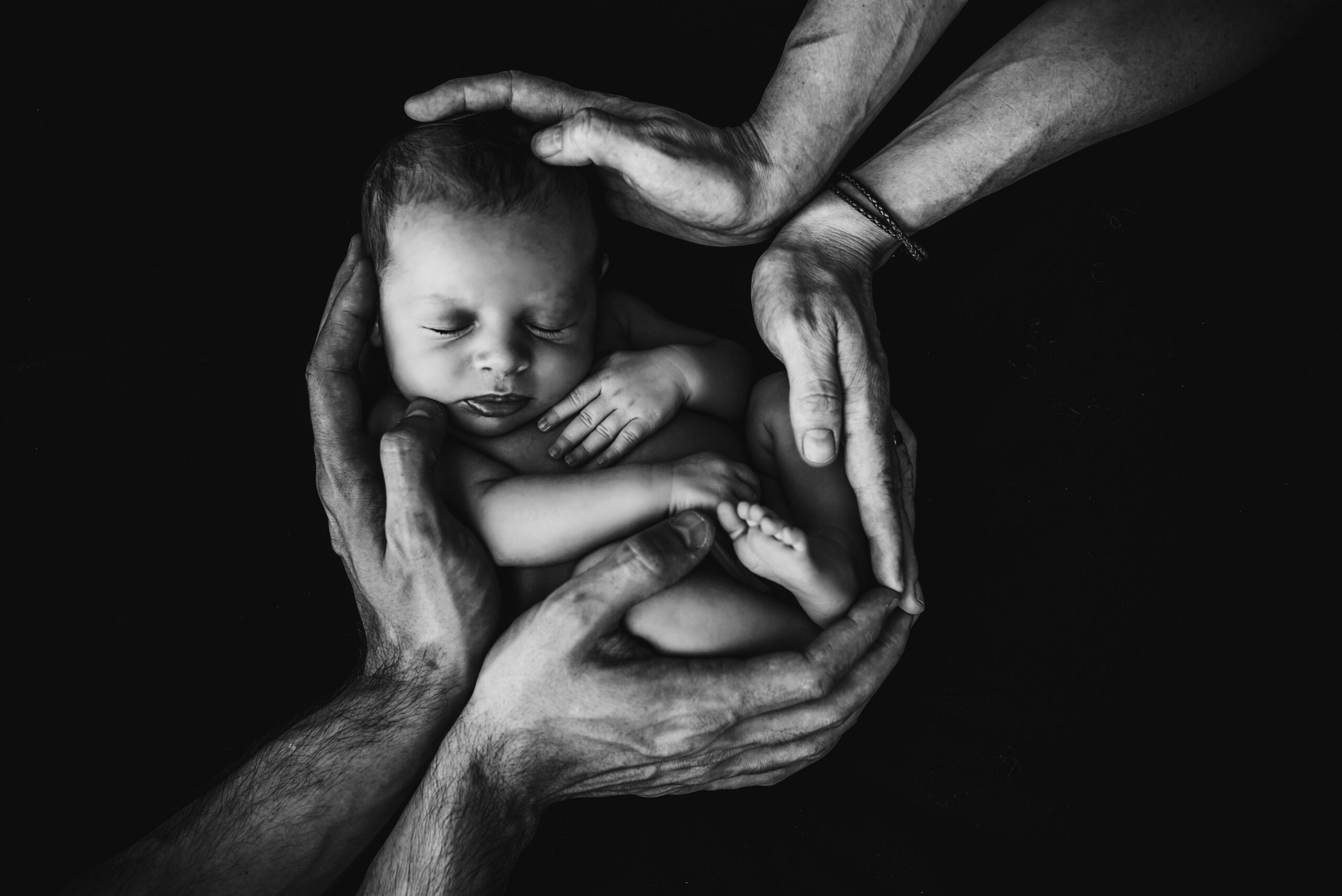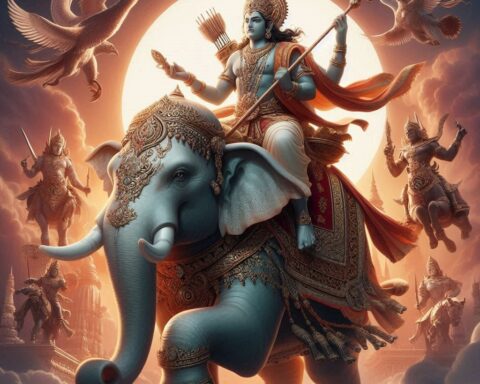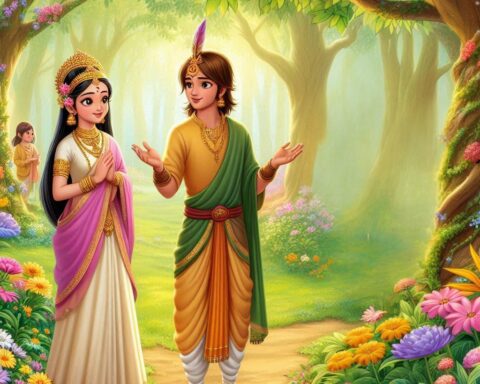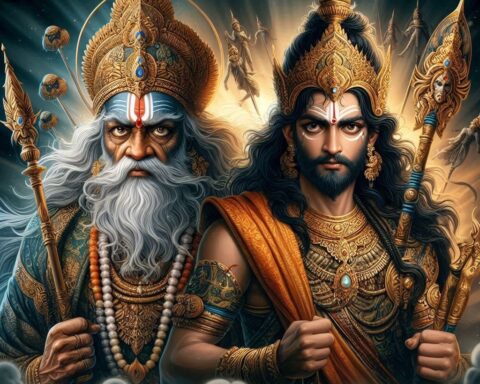It was a combination of fabulous fascination, unexpected astonishment, and overwhelming mother’s love that created a torturous turmoil in Kunti’s heart. She watched dazedly as the young, strapping, handsome warrior walked into the competition arena challenging her third son, Arjuna, in the archery competition. It was the graduation day ceremony of the Pandavas and Kauravas passing out from Dronacharya’s school.
Kunti had never expected to see him again ever in her life although his memory remained an indelible mark in the depths of her soul. But, here he was, clad in the unforgettable, dazzling armour and matching earrings. She almost swooned in shock. The other women sitting around her in the gallery from where they were watching the competitions rushed to her aid.
For a moment, everyone’s attention was on Kunti, and in that fleeting second, she made eye contact with the armoured lad. While there was no sign of recognition in his eyes, they were clouded with concern, the same concern that showed in the eyes of her five sons.
Not wishing to attract attention to herself, she quickly recovered and put on a brave face convincing everyone that her fainting bout was just a little aberration brought on by the excitement of the day. However, the sight of the new warrior made her realize inwardly that her day of reckoning was close at hand.
She recalled that glorious yet fateful day in her youth, a few years before her marriage to King Pandu. Then, she was lovingly called Pritha in her father’s home.
Pritha received a magical mantra from Sage Durvasa as a gift for the excellent service she rendered during his stay at her father, Kunti Bhoja’s palace in Kunti Rashtra. Pleased with her diligence and patience, the sage had taught her the mantra that could summon any divine being she desired. The sage had also warned her, “Once invoked, you cannot revoke the powerful effects of this shloka. So use it judiciously. You will need it in the future.”
Pritha’s mind told her to heed the sage’s warning and keep the mantra safe in her memory until the time of need. But the potent power of youthful raging hormones turned her heart blind to reason and logic. She desired to check out the efficacy of the chant. Early one morning bedazzled and smitten by the beauty of dawn, she decided to give in to her heart’s desire and use the mantra to summon Surya, the Sun God.
She took the help of her two personal maids, Mansi and Antara, who were also her closest companions. They created a secluded spot on a little, isolated island located in the middle of the river. When the preparations were done, Mansi and Antara moved away giving Pritha the privacy she needed to fulfil her desire. When alone, she chanted the mantra thinking of the brilliant Sun God.
In a flash, a handsome divine being stood next to her. The ravishing god’s eyes were filled with love and lust for her. The rhythmic sound of the gently-flowing river beneath, the sensuous feel of the zephyr brushing against her skin, the cooing of the birds, the heady fragrance of the myriad-hued flowers, the soft shadow of the surrounding dense trees, and her own beating heart enhanced the love in the air.
Suddenly, she panicked. She wanted to tell him that it was a mistake to have summoned him; that she was not ready for this. But she couldn’t because she was also in the throes of lust. She realized the importance of Sage Durvasa’s warning regarding the power of this mantra. But it was too late to undo her action.
When the mist of ecstasy cleared, she found herself holding the fruit of the godly union, her firstborn. Yes, he was her son, and he was beautiful. He was born with magical armour and earrings attached to his body known as the Kavacha-Kundala, divine gifts from his heavenly father, the Sun God.
“The armour will grow along with the boy and he will be deathless as long as the sheath of protection is on his body,” Surya promised Pritha. “Thanks to the divine Kavacha-Kundala, this child of mine will be known as Karna.”
Pritha looked at Surya and asked, her face filled with excited anticipation, “Will he become an emperor?”
Surya said with sadness, “No, my dear girl. Even though he is destined to be a demigod and a powerful, almost undefeatable warrior, he will never be an emperor.”
Kunti was horrified. Kunti was ambitious and she had always dreamed of being the mother of a powerful king. Before she could ask Surya any more questions, he left her and returned to his heavenly home. He had fulfilled the summons.
She again looked down at her firstborn and this time, she was more perplexed with worry than happy or excited. What could she do with the baby? How can she look after him? Would society accept him? More importantly, would she be able to marry into a respectable Kshatriya family and bear sons who would go on to become emperors?
Tears of remorse welled up in her eyes as she realized the import of her rash actions, and unwittingly, she cried out in grief and panic. Hearing her cries, Mansi and Antara came rushing to her side and were awed and horrified in equal measure to see Pritha holding the beautiful, smiling baby in her hands. Both of them immediately understood the impact of their friend’s action.
Not only had Pritha delivered an illegitimate child flouting all social norms, but she also put her future and that of the little one in jeopardy. She was faced with a terrible dilemma. Should she choose her future or her son? Mansi was Pritha’s voice of reason whereas Antara was the voice of the heart. The two friends tried their best to help Pritha out of her dilemma.
Mansi asked, “If you choose your son, would you have the courage to stand up against society and bring him up on your own? Who would marry a girl with an illegitimate child? Moreover, would your son be respected in our society?”
Pritha thought for a while and responded, “No, I don’t think I dare to stand up against a society which is not ready for this kind of revolution.”
Antara intervened, “So, are you going to abandon your child? What has the innocent child done to deserve this?”
Pritha’s face twisted in pain as she tried to manage her conflicting thoughts and emotions. “Yes, this child is innocent and it would not be right to abandon him.”
“Are you going to take him home and show him to your parents, then?” asked Mansi.
Pritha was horrified at this prospect. “No! I cannot bear to give them grief. What would they think of me? Wouldn’t they blame themselves for not giving me the right moral upbringing? What if they do something drastic?”
Antara said, “They are your parents and they love you. Go to them for help. Don’t let go of this child. He doesn’t deserve to be abandoned. Remember you are his mother.”
Mansi countered this with, “Do you think this child will be happy if he is going to be continuously ridiculed for being your illegitimate child? Would this society let you or him live in peace if you publicly acknowledged him as your son? And what about your own ambitions and desires? Are you ready to sacrifice them for this accidental child?”
At long last, Pritha decided it had to be the price of her firstborn for her future, and his own too. Some kind soul will look after the baby, and give him an honourable, happy life. She’ll make sure of that, she thought.
Crying bitterly, she ordered her maids to get a beautiful casket. She laid out the softest of cushions in it. She wrapped her son in a shawl made with the choicest silk and placed him in the ornate casket. He gurgled happily and seemed to understand his mother’s predicament.
Seeing his happy smile made it even more difficult for Pritha to carry out her task. She looked away guiltily. She also put a pouch full of gold coins next to the baby. It looked like she was trying to assuage her guilt with materialistic comforts and wealth.
She closed the lid and set the casket on the river, and watched with a heavy heart as it floated away from her. Pritha knew she was scarred for life and nothing could ever heal that.
Kunti was rudely shaken out of her reverie by the sounds of raucous, humiliating cries!
“Sutputra!”
“Sutputra!”
“You have no place among Kshatriyas! Go away from here!”
She wanted to scream out, “No! He is not the son of a charioteer. He is a Kshatriya as much as the five sons of King Pandu and the hundred sons of King Dhritarashtra! He is my son!”
But she did nothing but watch the proceedings as a mute, helpless spectator because the fear of societal backlash still gnawed at her. Her old scar reopened and she experienced searing pain far more intensely than she ever imagined. But she didn’t come to the help of her firstborn. She was as heartless now as she was when she let her baby float away from her many years ago. She could not bring herself to acknowledge Karna as her son today any more than she could when he was born.
As she watched the goings-on in the arena, Kunti realized that she had been paying the price for abandoning her child for years now; right from the time she was married to Pandu, the illustrious scion of the Kuru clan.
The struggle and hard life of living in exile with her husband, his premature, cruel death, and her return to Hastinapur as a helpless widow with five young children to care for; were all painful punitive payments she was making for years now. She had not known happiness and peace since that day of doom!
And she knew the perennial pain of her cruelty and the debts that life would extract from her would end only with her death, regardless of what happened to her children including Karna. The price for abandoning one’s child cannot be paid in one lifetime. She wondered how many more lives her cruel act would call for before it was satiated and balanced in the circle of life.
Photo by Isaac Quesada on Unsplash







Lovely read Ratna…Though the story is old this version brings a new emotion to the reader.
Thank you, Prema!